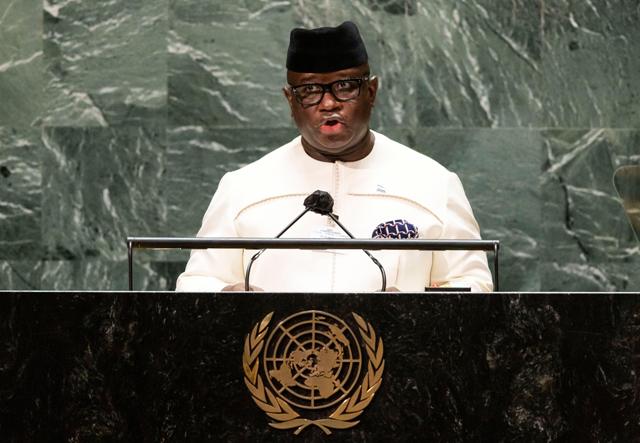 Sierra Leone's President Julius Maada Bio at the General Debate of the United Nations General Assembly in New York, September 2021. [photo: Justin Lane/Pool via REUTERS - Alamy stock]
Sierra Leone's President Julius Maada Bio at the General Debate of the United Nations General Assembly in New York, September 2021. [photo: Justin Lane/Pool via REUTERS - Alamy stock]
There has been good news and bad news for prisoners on death row in two Commonwealth states recently. Sierra Leone became the 110th country globally, and the 23rd in Africa, to end capital punishment when the west African nation’s parliament voted unanimously for abolition on 23 July. However, Malawi, which had abolished the death penalty on 28 April, disappointed campaigners in August by reversing the supreme court’s earlier ruling; after initially ruling that capital punishment contravened the right to life enshrined in the constitution, the court then declared that the previous decision had only represented the views of a single justice.
Abolition of the death penalty in Sierra Leone had been a manifesto pledge by President Julius Maada Bio, a former brigadier. There was praise for Bio from the European Union, which called the move a ‘significant milestone for the protection of fundamental human rights and freedoms in Sierra Leone’.
The country’s 1991 constitution mandated capital punishment for aggravated robbery, murder, treason and mutiny. The new law replaces the death penalty with sentences ranging from a 30-year term to life imprisonment. According to Amnesty International, there were 94 prisoners on death row in 2020, though no executions were carried out last year.
Kandeh Yumkella, an MP and former presidential candidate, called the decision ‘momentous’. He told the New York Times: ‘We had to reflect on it quite a bit. We thought of the political use of the death penalty, which has dogged us. We’ve had a history here where people have been charged with treason; some have been hanged.’
Sierra Leone has not executed anyone since 1998, when 24 soldiers were shot by firing squad during the civil war for their part in a coup attempt the year before. But more than 80 people have been sent to death row since then. In 2004, Sierra Leone’s Truth & Reconciliation Commission, which investigated atrocities committed during the civil war, concluded that ‘successive governments abused the death penalty to eliminate political opponents’ and said its abolition was a human rights ‘imperative’.
Rhiannon Davis, director of the Sierra Leonean women’s rights group AdvocAid, said the abolition would be particularly beneficial to women and girls accused of murdering an abuser. ‘Previously, the death penalty was mandatory in Sierra Leone, meaning a judge could not take into account any mitigating circumstances, such as gender-based violence,’ she said.
Meanwhile, Malawi’s U-turn on capital punishment has put the fate of 37 prisoners on death row there in question again, after April’s decision had seemed to finally bring clarity to the legal limbo they had been trapped in for years. In a 2005 ruling in the case of Kafantayeni v Attorney General, the high court had abolished the mandatory death penalty for murder, finding that an automatic death sentence did not allow for individualised sentencing and therefore was cruel and degrading punishment. However, article 16 of the 1994 constitution excluded the death penalty from constitutional challenges based on the right to life provision, even though the last executions were carried out in 1992, under Malawi’s former dictator Hastings Banda.
Issuing what it called a ‘perfected judgment’ that overturned the now-retired appeal judge Dunstain Mwaungulu’s ruling in Khoviwa v the Republic, the supreme court opinion, written by Justice RR Mzikamanda, said the full court had never struck off capital punishment and the ‘constitutionality of the death penalty itself did not fall for consideration in the present case’. Instead, the only issue was whether Charles Khoviwa was entitled to be heard before the trial court decided his sentence. According to the Death Penalty Information Center, this decision affirms the unconstitutionality of mandatory death sentences but leaves judges with the discretion to impose the death penalty in capital cases.
Campaigners insisted that while there may have been valid legal reasons for qualifying April’s ruling and even if no one had been executed in three decades, Malawi still needed to formally end capital punishment. ‘We need a lasting solution,’ said Michael Kaiyatsa, who heads Malawi’s Centre for Human Rights and Rehabilitation. ‘A way should be found to repeal this death penalty.’[13] According to Peter Dimba, an MP who chairs the parliamentary legal committee, it should not have been left to the courts. ‘This is an issue that was supposed to be done by the government,’ he said. ‘I don’t think parliament would have problems in abolishing the death penalty.’
Commonwealth member states stand out as anomalies in the general trend towards abolition of capital punishment in the past three decades. In 2017, the Death Penalty Project noted that only 37% of Commonwealth countries had abolished the death penalty in law, compared with 57% globally. Furthermore, many Commonwealth governments have been prominent defenders of the death penalty: the year before, half of the 40 countries that voted against a UN General Assembly resolution calling for a moratorium on executions were members of the Commonwealth.
Three Commonwealth countries carried out executions last year: Bangladesh, Botswana and India, Amnesty said. In Nigeria, according to the New York Times, at least 2,700 people are on death row. ‘The death penalty is a colonial imposition,’ said Sabrina Mahtani, co-founder of AdvocAid. ‘These laws were inherited from the UK.’



